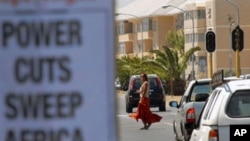Industry experts and executives are meeting to discuss how to make large scale energy projects work in sub-Saharan Africa. This year's African Utility Week is focusing on the need to work towards establishing inter-connectivity between the continent’s power-grids.
In the opening address, Emmanuel Nzabanita, of the African Development Bank, said part of the challenge is that most African countries want to work independently of their neighbors.
“If the African Development Bank can encourage the African countries to co-operate in the development of their energy resources, this would be a great thing. If we could have all Africans, all African countries inter-connected, then we could be able to exploit the vast resources that are available, that cannot be done by one individual country,” he said.
Nzabanita noted that different African regions have different resources that could benefit greater areas of the continent if used cooperatively. “We have in the north hydro carbons, gas; we have in the central and west, where there is a lot of hydro; we have in the south, where there is a lot of coal. But all these are scattered,” he states. “In order to harness them, we need to put our resources together.”
Alain Rosier, a project manager at an American power utility, told delegates the gap in power infrastructure financing on the continent is so extensive, Africa must attract private investment if it is to boost its deficient power sector.
“There is a big gap in the order of $30 billion, in the financing of the electricity infrastructure in sub-Saharan Africa that has to be prodded into by the private sector. Contrary to what many think, the lack of funding is often not a barrier, because there is money, and even during the crisis there was money available for good (viable and sustainable) projects,” Rosier explains.
Experts at the conference said the positive spin off for countries inter-connecting around power initiatives is that it widens the market.
The African Development Bank’s Nzabanita said inter-connected power conversation between countries has now begun. “It was maybe lack of knowledge of each other’s capability, or each other’s potential,” Nzabanita said. “But now, every country knows, through our regional co-operation meetings, that there are advantages of pooling their resources together.”
A two-day high-level so-called Power Indaba Summit runs parallel to African Utility week. This conference is focusing on investment potential in Africa’s power resources. Sustainable power for Africa is expected to top the agenda.




